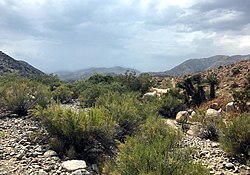2020
The 2020 United States census reported that Morongo Valley had a population of 3,514. The population density was 139.3 inhabitants per square mile (53.8/km2). The racial makeup of Morongo Valley was 73.8% White, 1.7% African American, 1.9% Native American, 1.8% Asian, 0.2% Pacific Islander, 8.8% from other races, and 11.9% from two or more races. Hispanic or Latino of any race were 20.9% of the population. [4]
The whole population lived in households. There were 1,624 households, out of which 18.0% included children under the age of 18, 34.1% were married-couple households, 8.7% were cohabiting couple households, 28.9% had a female householder with no partner present, and 28.3% had a male householder with no partner present. 39.3% of households were one person, and 16.3% were one person aged 65 or older. The average household size was 2.16. [4] There were 827 families (50.9% of all households). [21]
The age distribution was 16.1% under the age of 18, 5.4% aged 18 to 24, 23.2% aged 25 to 44, 32.3% aged 45 to 64, and 22.9% who were 65 years of age or older. The median age was 49.8 years. For every 100 females, there were 101.7 males. [4]
There were 1,960 housing units at an average density of 77.7 units per square mile (30.0 units/km2), of which 1,624 (82.9%) were occupied. Of these, 74.4% were owner-occupied, and 25.6% were occupied by renters. [4]
In 2023, the US Census Bureau estimated that the median household income was $56,821, and the per capita income was $33,049. About 18.3% of families and 22.9% of the population were below the poverty line. [22]
2010
At the 2010 census Morongo Valley had a population of 3,552. The population density was 140.8 inhabitants per square mile (54.4/km2). The racial makeup of Morongo Valley was 3,076 (86.6%) White (79.1% Non-Hispanic White), [23] 40 (1.1%) African American, 73 (2.1%) Native American, 31 (0.9%) Asian, 4 (0.1%) Pacific Islander, 187 (5.3%) from other races, and 141 (4.0%) from two or more races. Hispanic or Latino of any race were 531 people (14.9%). [24]
The census reported that 3,547 people (99.9% of the population) lived in households, 5 (0.1%) lived in non-institutionalized group quarters, and no one was institutionalized.
There were 1,602 households, 359 (22.4%) had children under the age of 18 living in them, 598 (37.3%) were opposite-sex married couples living together, 178 (11.1%) had a female householder with no husband present, 99 (6.2%) had a male householder with no wife present. There were 132 (8.2%) unmarried opposite-sex partnerships, and 26 (1.6%) same-sex married couples or partnerships. 554 households (34.6%) were one person and 203 (12.7%) had someone living alone who was 65 or older. The average household size was 2.21. There were 875 families (54.6% of households); the average family size was 2.87.
The age distribution was 646 people (18.2%) under the age of 18, 266 people (7.5%) aged 18 to 24, 745 people (21.0%) aged 25 to 44, 1,346 people (37.9%) aged 45 to 64, and 549 people (15.5%) who were 65 or older. The median age was 47.2 years. For every 100 females, there were 105.6 males. For every 100 females age 18 and over, there were 106.0 males.
There were 2,004 housing units at an average density of 79.5 per square mile, of the occupied units 1,159 (72.3%) were owner-occupied and 443 (27.7%) were rented. The homeowner vacancy rate was 4.7%; the rental vacancy rate was 7.9%. 2,489 people (70.1% of the population) lived in owner-occupied housing units and 1,058 people (29.8%) lived in rental housing units.
According to the 2010 United States Census, Morongo Valley had a median household income of $32,337, with 25.3% of the population living below the federal poverty line. [23]





